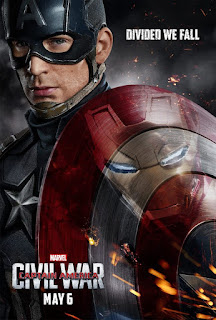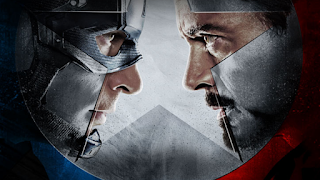Some of the most emotional moments of the last two Captain America movies involve Peggy
Carter, Steve Rogers’ love interest introduced in The First Avenger. While the scenes pack a huge punch thanks to the
heartfelt chemistry Chris Evans and Hayley Atwell had in the first film, they
are even more devastating after watching Agent
Carter.
Peggy’s spinoff show, set just after the events of Captain America: The First Avenger, is
actually the stronger of Marvel’s two ABC shows. This is in no small part due
to Atwell’s dynamic performance as Peggy, who transforms her character from
“Captain America’s girlfriend” into a fully independent, engaging, downright
badass woman who always gets the job done. A spy show like SHIELD, Carter manages to
occupy its own niche in the MCU by taking full advantage of its period setting.
Not just the aesthetics, but the whole mindset of a post-WWII America
struggling to redefine itself after the war.
Season One: A Sense of History
For Peggy, that means dealing with the overt sexism that
dominated the time. Carter’s first
season dealt almost exclusively with how men returning from war treated women
as glorified secretaries, ignoring their pivotal roles in the war effort both
at home and overseas. Peggy’s struggle is very real here, as she deals with her
male coworkers in the Strategic Scientific Reserve, the predecessor to SHIELD.
Undervalued as an agent, Peggy is forced to take matters into her own hands and
operate off the books when Howard Stark is framed for war profiteering. It’s a
fantastic setup that leads to real danger and intrigue for Peggy, who sets out
to prove her own worth as an agent in a world that no longer values her.
There are multiple reasons why Carter succeeds so spectacularly right out the gate, whereas SHIELD initially floundered. Aside from
Atwell’s performance, one of the show’s greatest aspects is its shortened
season. Compared to the 22 episode run of a SHIELD
season, Carter’s first season has
only eight episodes, while its second has ten. The miniseries vibe each season
gives off allows for a more focused story, with every episode furthering the
plot with next to no filler. The shorter season works wonders, as it maximizes
the potential of both the plot and its characters. Not only does Peggy become a
fully developed person here, but the entire supporting cast gets moments to
shine.
Peggy’s SSR coworkers, Daniel Sousa and Jack Thompson, come
to appreciate Peggy’s worth as an agent, while trying to find their own sense
of purpose after wartime. Howard Stark is back from The First Avenger with his womanizing ways, but secretly harbors an
immense guilt over some deadly inventions. The greatest side character, however,
is James D’Arcy’s Edwin Jarvis, Stark’s butler who will go on to serve as the
basis for Tony Stark’s A.I. (and therefore, the Vision) in the Iron Man and Avengers movies. Jarvis makes for a fantastic sidekick to Peggy, at
once entirely proper while not afraid to assist Peggy with whatever dangers she
faces.
Aside from the characters and more focused story, the period
setting gives Carter the breathing
room that SHIELD didn’t always have.
With its mid-to-late 1940s setting, the show is basically cut off from the rest
of the MCU, but gets to develop the universe more by giving the films a true
sense of history. We get to see how the SSR operates, and therefore an idea of how
the organization will grow into SHIELD. We see the villains using mind control
techniques that will one day be used on both the SHIELD show and in The Winter
Soldier. And amazingly, we also get a better look at the Red Room, the
Soviet operation that will one day create Scarlett Johansson’s Black Widow.
That development also introduces the show’s best villain,
Dottie Underwood, a proto-Black Widow who serves as a perfect foil for Peggy.
Equal parts charming and deadly, Dottie is a powerhouse who elevates the story
every time she’s on screen, especially when interacting with Carter. Her story
dovetails perfectly with Peggy’s, as Dottie actually becomes jealous of Peggy’s
lifestyle while Dottie was forced from childhood to be an assassin. This is
ironic, considering Carter struggles not only to be accepted by a patriarchal
society, but to move on from the tragedy of Steve’s “death.” Even with this
running thread, the show emphasizes how it’s not about Captain America. It’s
all about Peggy, and thanks to Atwell’s charisma and infinite charm, we as
viewers know it.
Season Two: New City, New Dangers
Carter season one
had a great story and even greater characters at its center. For its follow-up
(and unfortunately final) season, Agent
Carter sought to give more development to Peggy, Jarvis, Thompson and Sousa
while moving the story from New York to L.A. This gives the whole season an
entirely different feel from the last one, while still evoking that ‘40s-‘50s
period aesthetic which works so well for it.
Peggy’s past is glimpsed through some key flashbacks, which
give us a greater sense of who she was before she signed up with the SSR.
What’s more, we see her operate directly with her male co-workers, showing how
much more accepted she now is. Her teased romance with Sousa also moves forward
in big ways, but never acts as the season’s focus. Instead, we get newly
promoted SSR chief Jack Thompson being groomed for bigger things, while Peggy,
Sousa and Jarvis deal with new villain Whitney Frost, a brilliant scientist who
masquerades as a famous actor.
Frost acts as both a worthy opponent and another great foil
to Peggy. Whereas Peggy was encouraged in her youth to break free of society’s
expectations of her, Frost was forced to hide her scientific brilliance and got
by solely on looks. It makes for a great dynamic between the two, helped by
Frost’s scientific background and knack for strategy. She’s at the center of a
conspiracy involving Zero Matter, a destructive property from another dimension
discovered during an atomic bomb test.
Zero Matter becomes the season’s focus, and while it
provides a neat allegory for atomic threats, its full capabilities are never
really shown. The characters talk about how it could potentially change the
world, but aside from nearly blowing up a city, we never really get a sense of
what’s so game changing about it. Compared to the straightforward Stark
inventions that fueled season one, Zero Matter just doesn’t measure up. It’ll
probably come in very handy for explaining parts of the Doctor Strange movie in November, but here, it’s almost out of
place.
Zero Matter of Stakes
The Zero Matter also reduces Whitney Frost’s effectiveness
as a villain. After getting “possessed” by it, Frost slowly goes insane, which
ends up hurting her role in the plot. She plays next to no role in the season’s
climax, and as such the stakes don’t feel as high as the first season’s, where
Dottie and a vengeful Russian agent nearly destroyed New York. It’s such a
shame too, as up to that point Frost was a more than compelling villain. Jack
Thompson’s role doesn’t fare too much better, as he becomes wrapped up in a
conspiracy involving an elite Patriarchy club that connects with Frost’s story
but isn’t nearly as interesting. Thompson is developed more, and the club he’s
groomed to join serves its purpose with Frost, but it’s simply not as engaging
as a threat to Peggy and the SSR.
Thankfully, the season’s more uneven parts are balanced out
by some fantastic character work. Jarvis benefits greatly from this, as we meet
his wife and get to see more of his mindset when going on missions with Peggy.
It all snowballs into an emotionally devastating event which renders Mrs.
Jarvis unable to have children, made all the more heartbreaking by Jarvis’s
reaction to the news. It’s also unintentionally a huge moment for the MCU,
since it’s probably Jarvis’s inability to have children that leads him to help
raise Tony. By the end of the season, there is no longer any mystery as to why
Stark would base an A.I. after this man.
Conclusion: We Know Her Value
Ultimately, the greatest flaw of season two is how it wraps
up almost all of its major story beats only to leave things on a massive
cliffhanger. A major character is shot over a file regarding one of Peggy’s
WWII missions. This is infuriating, because with the show’s recent
cancellation, we’ll never see it resolved. Neither will we see how the SSR became
SHIELD, nor whether Sousa is the husband Peggy refers to in Winter Soldier (he probably is, but
still, it’d be nice to know).
Yes, the events of the last two Captain America movies (and her cameo in Ant-Man) make this all inconsequential in the long run. We know
Peggy founds SHIELD, gets Alzheimer’s and then dies by Civil War. But that doesn’t account for how Agent Carter has fleshed out this very interesting part of Peggy’s
life, a part that we’ll never get proper closure to. Barring a Netflix
continuation, a TV movie, another One Shot or flashbacks on SHIELD, this is it for Agent Carter. And it’s a massive shame,
because despite a few season two flaws, this was a huge testament to the power
a female-centric show could wield.
Carter’s best
moment came at the end of season one, when Peggy is denied credit for saving
New York. She makes a statement that perfectly sums up why the show was so
great. “I know my value; anyone else’s opinion doesn’t really matter.” It’s a
fantastic quote that emphasizes how confident Peggy is, and how confident
Atwell is playing her. It’s a statement on how Peggy is just as good, and often
better, than the men around her in a world that is constantly trying to push
her down. But in the wake of the show’s cancellation, it’s also a rallying cry
for fans to never forget just what Peggy has done for the MCU. She’s not just
Marvel’s first female lead. Peggy Carter is one of the MCU’s best characters,
period. Agent Carter made all its
viewers know that, so her value can continue to be seen now that the show, and
her character, have passed on.











